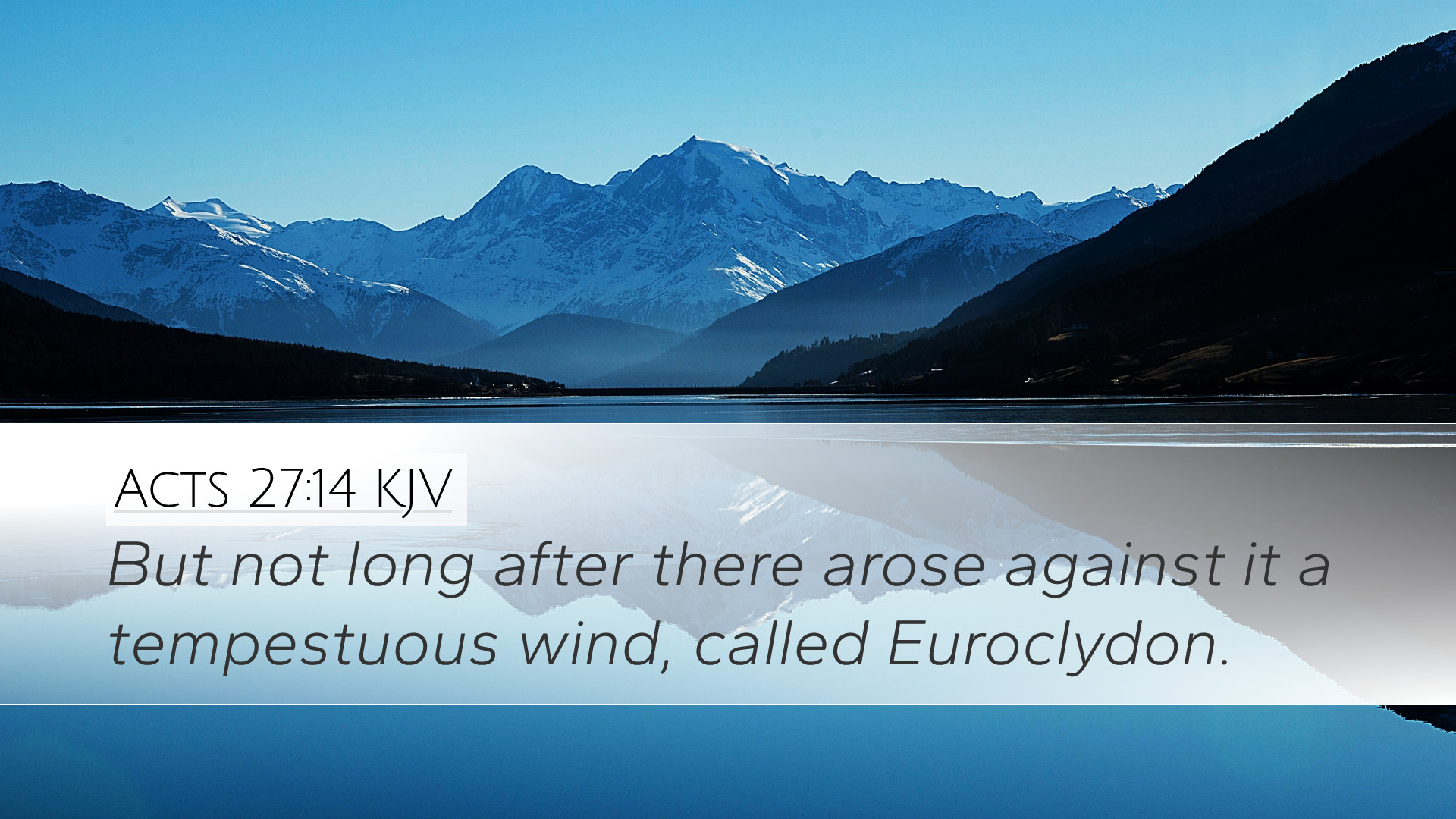Commentary on Acts 27:14
Verse: "But soon a tempestuous wind, called Euroclydon, arose."
Introduction
The narrative of Acts 27:14 occurs during Paul’s journey to Rome, which is critical not just for its historical context but also for its theological implications. This verse serves as a pivotal moment in the account of Paul’s voyage, characterized by an imminent storm that illustrates the challenges and adversities faced by believers in their missions.
Contextual Background
Acts 27 outlines Paul’s journey as he is transported to Rome for trial. The mention of a "tempestuous wind, called Euroclydon," suggests a severe meteorological phenomenon that caused panic and fear among the crew and passengers. Understanding the geographical and meteorological backdrop of this passage assists in portraying the gravity of the situation.
Meteorological Significance
The term "Euroclydon" refers to a southeast wind that often brings violent storms to the Mediterranean, particularly in late autumn. Such storms were well known to ancient mariners and were feared for their unpredictability. The invocation of this wind reinforces both the peril of the journey and the sovereignty of God over natural elements.
Theological Reflections
This verse embodies several key theological reflections pertinent to pastors, theologians, and Bible scholars:
-
The sovereignty of God: The storm serves as a reminder that while calamities can arise unexpectedly, they do not escape God's watchful care. As Matthew Henry comments, "God’s providence is sometimes seen in the storms and tempests of life, yet His purposes will be accomplished."
-
The perseverance of faith: Paul’s reactions to the impending disaster highlight the necessity of steadfastness amidst adversity. As Albert Barnes remarks, "Believers may find themselves in the hands of fate, yet through faith, they can endure."
-
Human fragility: The sailors' fear and the turbulence of the sea illustrate humanity's vulnerability in the face of natural forces. Adam Clarke notes, "The trembling sailors depict man's utter helplessness without divine assistance."
Implications for Ministry
The implications derived from Acts 27:14 have significant relevance for modern ministry:
-
Encouragement in Crisis: Just as Paul faced perilous circumstances with courage, pastors and leaders are called to encourage their congregations to trust God amidst life's storms.
-
Preparation for Trials: Understanding the nature of life's unpredictability prepares Christians for trials, affirming the necessity of a firm foundation in faith, as noted in many commentaries.
-
Community Support: The collective fear among the ship's crew serves as a reminder of the importance of community in times of crisis. Discipleship is often tested in the storms of life, and mutual support is essential.
Historical Insights
Historical context further enriches our understanding of this verse:
-
Paul's Leadership: As a prisoner, Paul's role on the ship offers an example of how spiritual authority can manifest in leadership, even amidst adversity. His guidance would later prove pivotal as the storm worsened.
-
Maritime Practices: The understanding of the seafaring practices of the time provides clarity on the urgency of the sailors' reactions and their attempts to manage the crisis, as noted in Clarke’s commentary.
Exegesis of Euroclydon
Examining the specific term “Euroclydon” reveals more than just a storm; it symbolizes spiritual trials and tribulations:
-
Spiritual Parallels: Just as the Euroclydon wreaks havoc on the ship, various spiritual Euroclydons affect the faith journey of believers, causing doubt, fear, and spiritual turmoil.
-
Lessons on Hope: Despite the storm, God’s presence remains steadfast, suggesting that hope exists even in the midst of trial. This theme appears strongly in the writings of Henry and other commentators.
Conclusion
Acts 27:14 serves as a poignant reminder of the many storms we face in our spiritual and earthly journeys. Drawing from the insights of Matthew Henry, Albert Barnes, and Adam Clarke, we see that while the tempest of Euroclydon brought fear, it also provided an opportunity for faith to rise above circumstances. As believers reflect on this passage, they are encouraged to recognize God's sovereignty and grace in the midst of turmoil, rooting their hope in His everlasting promises.


